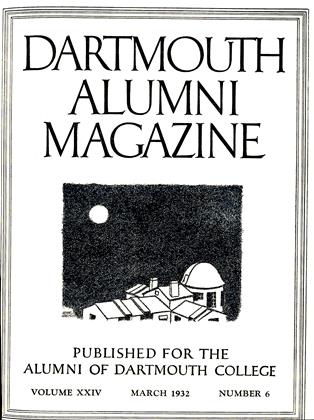After an illness of several months Professor John Wesley Young died at Dick's House on February 17.
Professor Young was born at Columbus, Ohio, in 1879, and was educated in this country and in Germany. He received the degree of Ph.B. from the Ohio State University in 1899, the degrees of A.M. in 1901, and Ph.D. in 1904 from Cornell. He has taught at Northwestern, Princeton, the University of Illinois, the University of Kansas, the University of Chicago and Dartmouth. He has been professor of mathematics at Dartmouth since 1911.
As a mathematician Professor Young had an international reputation. For many years he was editor of the Bulletin of the American Mathematical Society. He was chairman of the national committee on mathematical requirements from 1916 to 1923 and was president of the Mathematical Association of America from 1929 to 1931. He was a member of many mathematical societies both in this country and in Europe, and was the author of many books and articles on mathematical subjects. At a meeting of the Council of the American Mathematical Society which occurred during Professor Young's illness, the following vote was passed: "That the Council place on record its profound appreciation of the work of Professor Young on this committee, which has laid foundations and mapped out plans for further progress, which will be of the greatest value to the society."
By the death of Professor Young the Dartmouth faculty loses one of its most distinguished and also one of its most useful members. He had the mathematical mind at its best—precise and logical, but always unprejudiced, always ready to consider the other side of any question, mathematical or otherwise. In spite of his specialized scholarship he was a man of wide interests, with a keen appreciation of humanity and a never-failing sense of humor. To many, not only in this community and in the larger academic world, but in every walk of life, Professor Young was a real friend and his death will be a source of personal sorrow. To his family he was not a mathematician but a devoted husband and father, whose chief thought was always of his home.
One cannot help a feeling of great regret when a man of these characteristics and of these attainments is taken away in the prime of life, when there is so much that he might have done in the years to come. On the other hand, in the case of Professor Young, it will be a consolation and a lasting comfort to his family and his many friends that in a comparatively short life he accomplished so much and that, not only on account of his achievements, but on account of his lovable personal qualities, he will always be remembered with the highest regard and with sincere affection.
 View Full Issue
View Full Issue
More From This Issue
-
 Article
ArticleFrom War to Depression
March 1932 By Bruce Winton Knight -
 Lettter from the Editor
Lettter from the EditorEditorial Comment
March 1932 -
 Lettter from the Editor
Lettter from the EditorDartmouth Manuscript Series—The First Volume
March 1932 -
 Article
ArticleProfessor Einstein, Relativity, and Mt. Wilson
March 1932 By Walter S. Adams -
 Class Notes
Class NotesCLASS OF 1931
March 1932 By Jack r. Warwick -
 Class Notes
Class NotesCLASS OF 1905
March 1932 By Arthur E. McClary







